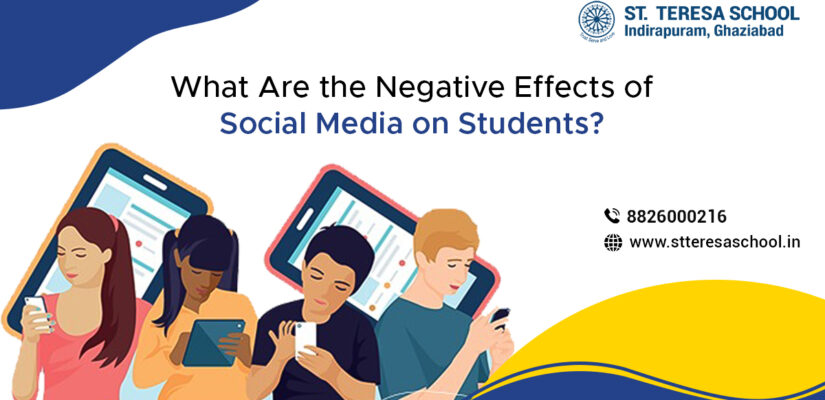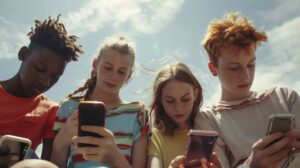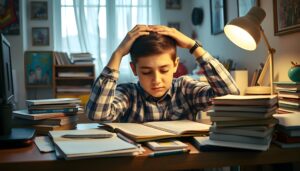
What Are the Negative Effects of Social Media on Students?
Social media has become an integral part of our lives, especially when considering the effects of social media on students. While it offers a platform for connection, learning, and entertainment, it also comes with its share of downsides. Many students are unaware of the negative effects that social media can have on their academic performance, mental health, and overall well-being. In this blog, we will explore what are the negative effects of social media on students and offer insights into how they can navigate these challenges.
Academic Distraction: A Growing Concern

Social media affects academic achievement and impacts daily routines. The constant notifications, updates, and messages can be incredibly distracting. Instead of focusing on their studies, students often find themselves scrolling through feeds, watching videos, or chatting with friends.
This not only reduces the time they spend on studying but also affects their concentration and retention abilities.The habit of multitasking, like studying while keeping an eye on social media, often leads to poor academic results. Students may believe they can handle both simultaneously, but in reality, their productivity and comprehension suffer.
This distraction is a growing concern that needs to be addressed by both educators and parents to ensure that students can achieve their full academic potential.
Impact on Mental Health: The Silent Struggle

Another critical area where social media negatively affects students is their mental health. The pressure to present a perfect image online, constant comparison with others, and exposure to cyberbullying are just a few ways social media can lead to stress, anxiety, and depression.
Students often measure their self-worth based on the number of likes, comments, or followers they have, leading to feelings of inadequacy when they don’t meet these superficial standards.
These are the basic impacts of social media that eight out of ten students experience. Additionally, the anonymity of the internet can embolden bullies, making students vulnerable to harmful comments and messages. This constant exposure to negativity can erode a student’s self-esteem and overall mental health.
Social Skills: A Decline in Real-Life Interaction

While social media connects people online, it often disconnects them in real life. Nowadays, a lot of students would much rather communicate or connect online than have in-person chats, which eventually lead to social media addiction.
This shift has led to a decline in social skills among students, making it challenging for them to communicate effectively in real-life situations.The over-reliance on social media can hinder the development of essential communication skills, such as empathy, listening, and non-verbal cues. These skills are crucial for building meaningful relationships and succeeding in both personal and professional life. Without these skills, students may struggle to navigate social situations, leading to feelings of isolation and loneliness.
Sleep Deprivation: The Hidden Culprit

Sleep is vital for a student’s overall health and academic performance. However, social media can be a significant contributor to sleep deprivation. Many students stay up late scrolling through their feeds, responding to messages, or watching videos. This late-night screen time due to excessive social media usage can disrupt their sleep patterns, leading to inadequate rest.
Lack of sleep affects a student’s ability to focus, learn, and retain information. It can also lead to mood swings, irritability, and a weakened immune system. The blue light emitted by screens can further disrupt the production of melatonin, the hormone responsible for regulating sleep, making it even harder for students to get the rest they need.
The Role of St. Teresa School: Guiding Students Towards a Balanced Life
At St. Teresa School, we recognize the challenges that social media presents to our students. Our approach is to educate and guide students on the responsible use of social media while emphasizing the importance of real-life interactions, academic focus, and mental well-being.
We encourage students to strike a balance between their online and offline lives. By promoting awareness of what are the negative effects of social media on students, we aim to equip them with the tools they need to navigate the digital world safely and responsibly. Our programs and initiatives are designed to foster a healthy relationship with technology, ensuring that students can enjoy the benefits of social media without falling prey to its pitfalls.
Promoting Healthy Social Media Habits
In conclusion, while social media offers many advantages, it is essential to be aware of its negative effects on students. From academic distractions to mental health issues, social media can have a significant impact on a student’s life. However, with the right guidance and awareness, these challenges can be mitigated.
St. Teresa School is committed to helping students develop healthy social media habits. By fostering a balanced approach to technology use, we aim to ensure that our students can thrive both academically and personally.
Through education and support, we strive to create an environment where students can enjoy the benefits of social media without compromising their well-being.
FAQ
How does social media affect students’ behavior?
Social media plays a crucial role in student’s behaviors by shaping their mindset, social interactions, and time management. It might also cause distractions, peer pressure, or positive connections, depending on usage.
Does social media affect students’ performance?
Yes, social media can affect students’ performance by distracting them from studies, reducing focus, and impacting sleep patterns. However, responsible use can offer educational resources and connections.
How to avoid social media?
To avoid social media, set daily limits, uninstall apps, and engage in offline hobbies. Stay connected with friends through calls or in-person. Use tools to block distractions and prioritize real-life interactions.
How many teenagers use social media?
Ninety-five percent of youngsters use social media. Teenagers most frequently use well-known apps like Instagram, Snapchat, and TikTok to communicate with peers, exchange material, and keep current.
What age is Instagram OK?
Instagram is generally recommended for ages 13 and up, as per the platform’s guidelines. This age limit helps ensure a safer social media experience for younger users.